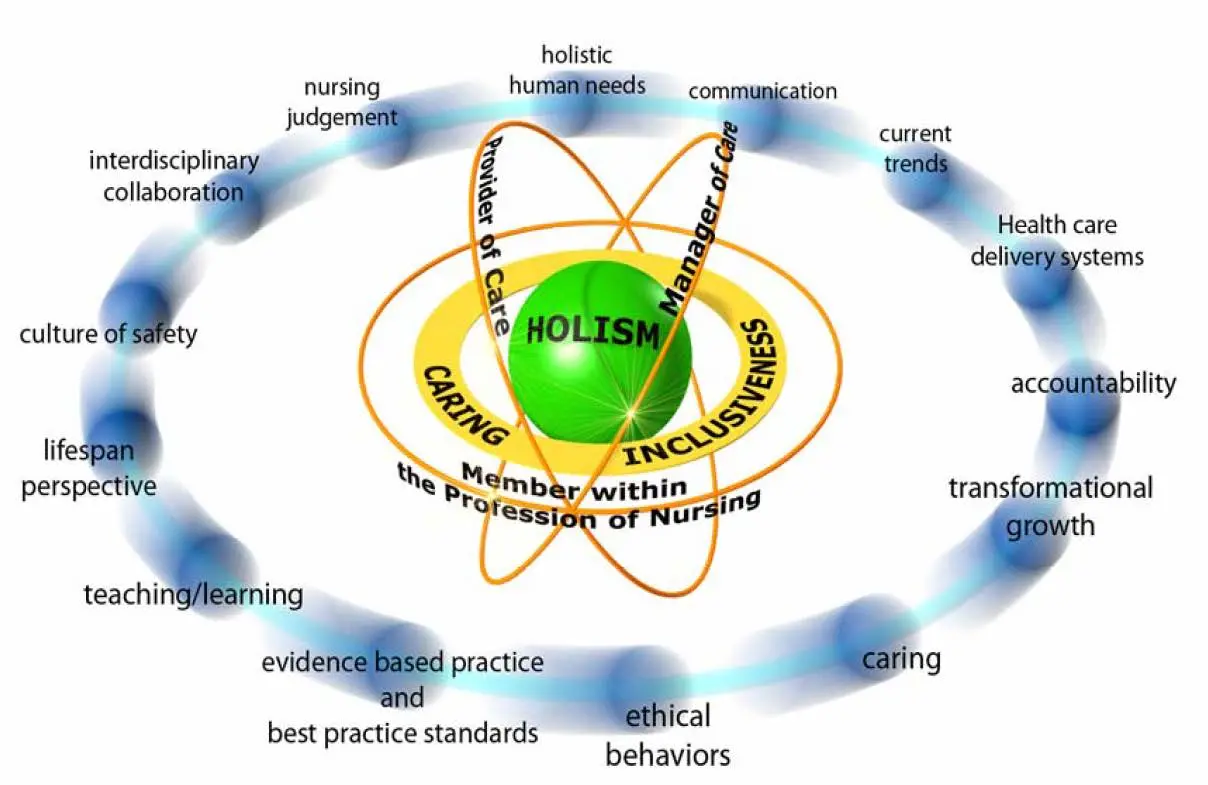
Nursing Program History
The Health Science Education Department at Raritan Valley Community College was originally organized in 1969 as the Nursing Department and graduated its first class in 1972. Since its inception, the nursing program has been accredited by ACEN (formerly the National League for Nursing Accrediting Commission), 3343 Peachtree Road NE, Suite 850, Atlanta, Georgia 30326, 404.975.5000, Fax 404.975.5020, https://www.acenursing.org/ and licensed by the New Jersey Board of Nursing.
In 2002, our scope expanded to include the Associate of Applied Science degree in Ophthalmic Science and Certificate Programs for Fitness and Medical Coding. Articulation agreements exist between the nursing department and Rutgers, The State University of New Jersey, College of St. Elizabeth, New York University and Drexel University. In 1997, the Department was named the Center of Excellence, in recognition of the outstanding achievements of the nursing students and the nursing faculty. The University Center at RVCC was created in 2001 and through this center nursing students can work towards a BSN from Fairleigh-Dickinson University, Seton Hall University and Kean University and licensed by the New Jersey Board of Nursing.
NURSING PROGRAM MISSION STATEMENT
The Raritan Valley Community College Nursing Program prepares the student to function in three nursing roles – Provider of Care, Manager of Care, and Member of the Profession, which encompasses knowledge and competence as an entry-level professional nurse, by developing individualized plans of care based on contemporary research, respect for diversity, professional interpersonal skills and technological competency.
Nursing Program Philosophy
Our Nursing Program philosophy reflects faculty beliefs about humans, health care, nursing education, and practice of Associate Degree Nursing graduates. The philosophy reflects faculty beliefs about:
- Humans
- Healthcare
- Nursing education
- Practice of Associate Degree Graduates
Humans
We believe that humans are multifaceted, diverse, holistic beings who are deserving of care given with a spirit of respect and inclusivity. Within this contextual framework, nursing care supports each individual’s efforts to reclaim or develop new pathways of health and human flourishing. As members of society, humans are affected by external forces, including but not limited to, their economic, social, demographic, and political environment.
Healthcare
We believe that quality health care focuses on holistic health promotion, illness and injury prevention and, psychosocial support throughout the lifespan. As nurses we facilitate the individual’s adaptation to changes which occur during growth and developmental stages, or alterations in health status. Our goal as professional nurses is to provide individuals with the care, knowledge and resources to attain their highest level of function in response to the emotional and physical changes brought about by illness or injury, thus helping them to create for themselves a new sense of normalcy. This requires that nurses have cognitive, psychomotor and affective domain competencies. Nurses must respond to current societal trends and changes that affect healthcare delivery systems and the evolving professional role of nurses. They must also identify the changes that are needed within the various delivery systems and health care settings by being active participants in the change process. Using nursing judgment and a spirit of inquiry, nurses interact with other health care team members to identify problems and gather scientific data relevant to emerging nursing research. This interdisciplinary, collaborative process leads to evidence-based practice, where nurses apply the results of clinical research and best practices. Progress will be most productive, when nurses question the status quo, challenge assumptions, and promote innovative patterns of problem solving. As change occurs in the health care environment, nurses must anticipate the direction of the change and support innovative patterns of responding to the needs of patients, families, and the community.
Integral to all facets of change is ability to communicate effectively. The ability to therapeutically communicate face-to-face and to utilize technology for communication and documentation is essential to providing quality, patient centered care. From these changes, an improved health care delivery system will emerge that will benefit everyone including the individual, family and community.
Nursing Education
Nursing education is a lifelong learning process that results in transformational growth. This transformational growth begins with a progressive course of learning activities, designed to facilitate the development of nursing practice competencies, based on best practice and evidence-based clinical practice standards. The desired outcome of this process is to prepare a safe and competent entry level professional nurse who designs care for diverse populations in multiple care settings.
We believe in creating a learning environment that facilitates adult learners to be self-motivated, independent thinkers committed to continuing education both formally and informally. Nurse educators facilitate the educational process with students by creating an interactive learning environment, with students and faculty having specific rights and responsibilities, using evidence-based pedagogy, technology and clinical resources to support students with varied learning styles to encourage reflective learning.
We believe that effective education is based upon the development of a learning community with all concerned learning from each other through collaboration to advance the acquisition and practice of quality care delivery. The learning environment is based upon academic integrity, trust, open communication, and honest, accurate feedback in the cognitive, psychomotor, and affective domains of learning.
Practice of Associate Degree Graduates
To function effectively in a society and a health care delivery system challenged by rapid changes, the associate degree nursing graduate must demonstrate cognitive, psychomotor and affective skill acquisitions in the core components/competencies that characterize the roles of the nurse: provider of care, manager of care, and member within the discipline of nursing. All these roles incorporate a culture of safety and a philosophy of inclusiveness. These core components and competencies are based on (1) Educational Competencies for Graduates of Associate Degree Programs (National League for Nursing, 2010), (2) NCLEX-RN test plan (2016), (3) Institute of Medicine – Future of Nursing report (2010), and (4) Quality and Safety Education for Nurses (QSEN) (2012).
In the provider of care role, the associate degree nursing graduate demonstrates accountability by responding to human needs and factors that contribute to or threaten health, by applying relevant theories, research, evidence-based guidelines, and principles of teaching and learning within the scope of nursing practice as mandated by the New Jersey Board of Nursing. Nurses provide direct care for individuals and families, recognize community needs and an awareness of local, national and global health needs. Nursing practice embraces the core values of the National League for Nursing: caring, diversity, excellence, integrity, ethics, holism, and patient-centeredness (NLN Competency Model, 2010, fig 1).
As nurses collaborate with professionals from other disciplines, they are uniquely qualified to make critical decisions and assist individuals to meet their changing needs across the lifespan. As a manager and coordinator of care the associate degree nursing graduate provides for the health care needs of individuals and groups through direct or delegated care. In this role it is essential that the graduate utilize effective, respectful communication skills, and use appropriate channels of communication within the inter-disciplinary organizational system.
In the role as a member within the discipline of nursing, the associate degree nursing graduate provides evidence of a personal and professional commitment to life-long learning, professional self-awareness, and supports empowerment of nurses as integral members of the health care system. Nurses encourage social responsibility and sustained engaged citizenship, through their commitment to caring, advocacy, positive social change, ethical behaviors based on the ANA Code of Ethics for Nurses to deliver competent nursing care for diverse populations.
NURSING PROGRAM OUTCOMES AND STUDENT LEARNING OUTCOMES
Nursing Program Outcomes:
The nursing program of Raritan Valley Community College exists to:
- Promote educational excellence as evidenced by:
- Maintaining a Nursing Program graduation rate of 70% for students entering the four semesters of clinical nursing courses.
- Meeting or exceeding the national pass rate by first time test takers on the National Council Licensure Examination (NCLEX-RN) for associate degree programs as reported by the National Council of State Boards of Nursing (NCSBN).
- Reported satisfaction with the program of learning by nursing graduates at a rate of 90% on the graduate survey.
- Meet the health care needs of the community by providing entry level nurses as evidenced by:
- Achieving a 70% job placement rate as a Professional Registered Nurse within one year of licensure.
- Recognizing the need for life-long learning, nursing graduates will report on the graduate survey a 50% possibility of pursuing a baccalaureate degree in nursing with 5 years after graduation.
Student Learning Outcomes:
- The student will function as providers of care when they:
1.1. Integrate holistic human needs in providing safe nursing care while encouraging human flourishing of diverse patients in families and communities.
1.2. Use nursing judgment to assess patient situations and perform clinical decision making.
1.3. Collaborate appropriately and effectively with interdisciplinary members of the health care team.
1.4. Construct therapeutic interventions within a culture of safety using the nursing process.
1.5. Integrate principles of growth and development with a lifespan perspective.
1.6. Utilize teaching/learning principles to improve outcomes when caring for patient at different levels of wellness.
1.7. Utilize evidence based practice/best practice standards when planning and delivering nursing care.
2. The student will function as managers of care when they:
2.1 Demonstrate leadership and management by employing strategies that adapt to different health care delivery systems.
2.2. Apply concepts of current trends, including information technology, when planning and delivering nursing care.
2.3. Utilize communication effectively to meet the health care needs of diverse populations.
3. The student will function as members within the profession of nursing when they:
3.1. Incorporate ethical behaviors based on the ANA Code of Ethics for Nurses when providing care.
3.2. Implement behaviors which embrace the values of caring, integrity, and inclusiveness.
3.3. Engage in activities for professional development, transformational growth, and life-long learning.
3.4. Demonstrate accountability by following the ethical/legal guidelines for professional practice in accordance with the Rules and Regulations of the New Jersey Board of Nursing.
Conceptual Framework of the Nursing Program

Innovative Teaching
- Service Learning
- Honors Options Sections
- Clinical Learning Experiences
Purpose of the Nursing Program
The nursing program of Raritan Valley Community College exists to:
- Promote educational excellence through the provision of a balanced and current curriculum, which combines general education courses, courses in the physical, social and behavioral sciences, arts and humanities as well as established nursing principles, concepts and interventions, as evidenced by the following benchmarks:
- Matriculated students in the Nursing program will maintain a nursing program graduation rate of 70%
- Graduates of the program will achieve an aggregate pass rate on the National Council Licensure Examination (NCLEX-RN) of 80%
- Graduates of the program will report satisfaction with the program of learning at a rate of 90% on the graduate survey
- Maintenance of accreditation from ACEN (formerly the National League for Nursing Accrediting Commission, Inc
- Maintenance of accreditation from the New Jersey State Board of Nursing
- Meet the health care needs of the community by providing entry-level nurses prepared to participate in health care settings as members of the health care team, as evidenced by the following benchmark:
- Graduates of the program will achieve a 70% job placement rate as a professional registered nurse within six months of successful completion of the NCLEX-RN.
- Promote educational excellence through the provision of a balanced and current curriculum, which combines general education courses, courses in the physical, social and behavioral sciences, arts and humanities as well as established nursing principles, concepts and interventions, as evidenced by the following benchmarks:
ABILITIES AND SKILLS REQUIRED FOR SUCCESS IN THE DEPARTMENT OF NURSING
A successful candidate for nursing at Raritan Valley Community College must possess certain abilities and skills necessary to administrate safe and effective care.
The candidate must be able to function on an independent level without an intermediary. These skills and abilities include: observation, communication, motor skills, cognitive and intellectual skills, behavioral and social attributes.
- Observation
The candidate must have the ability to observe a patient. In order to observe a patient, the nurse must possess the ability to utilize the senses skillfully. The nurse must have the ability to see, hear, smell, touch the patient.
- Communication
The candidate must be able to speak, read, comprehend, write and listen attentively in the English language. These abilities are essential in patient contact, as well as with the patient’s family and when collaborating with members of the health team. A candidate whose second language is English is required to successfully complete the American Language Studies Program.
- Motor
The candidate must be able to administer physical care to patients in different settings (i.e., assisting the patient in the activities of daily living, feeding, bathing, assisting the patient to get out of bed, lifting and transferring) operate various equipment utilized in the patient’s care; have stamina for clinical work; possess gross and fine movements for the operation of certain equipment (i.e., taking blood pressure, handling syringes and needles or maintaining aseptic technique, i.e., dressings). Ability to push, pull, support, roll, patients, as well as the ability to life infants and children is required.
- Cognitive-Intellectual
The candidate must possess the ability to think critically (i.e., comprehend, interpret, analyze, and synthesize and evaluate) which is essential to the problem-solving technique necessary in patient care. Application of theory to practice is mandatory in affording the patient safe, quality care.
- Behavioral and Social Attributes
The candidate must possess emotional stability which includes adapting quickly to changing environments, focusing attention on task, accountability for monitoring/controlling own emotions, dealing with the unexpected, and performing multiple responsibilities concurrently. In addition, the candidate must possess honesty and integrity that provides the capacity to function effectively in a healthcare setting.
- Hearing and Visual
The candidate must be able to hear normal speaking levels, faint noises, faint body sounds, hear in situations when not able to see lips, hear auditory alarms and to see objects up to 20 feet away such as computer screen or client in a room.




